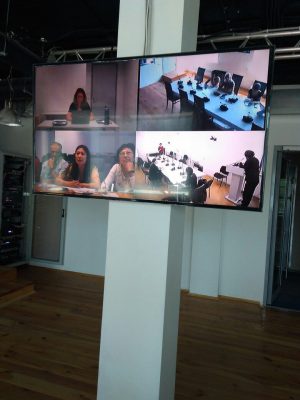Dissemination of Best Practices in Conference Interpreter Training: Webinar with Universities of Geneva, Kazan and Astana within the Framework of the European Parliament Project!
 On June 27, the Caspian Higher School of Interpreting and Translation together with University of Geneva held a webinar for partner universities – the Kazan Federal University and L.N.Gumilyov Eurasian National University (Kazakhstan) – within the framework of the European Parliament project “Dissemination of Best Practices in Conference Interpreter Training between EU and non-EU languages”
On June 27, the Caspian Higher School of Interpreting and Translation together with University of Geneva held a webinar for partner universities – the Kazan Federal University and L.N.Gumilyov Eurasian National University (Kazakhstan) – within the framework of the European Parliament project “Dissemination of Best Practices in Conference Interpreter Training between EU and non-EU languages”
The project partners were to discuss several issues – to identify practical efficiency of the previous webinar, dedicated to specific features of teaching interpretation, to outline further steps under the project and to consider proposals from the Kazan and Kazakhstan universities in regard to upcoming joint “virtual” events.
Both the Eurasian National University and Kazan Federal University feel excited about taking part in virtual classes planned for the upcoming academic year within the EP project. They are ready to involve their English language MA students and may be even students with Kazakh and Tatar languages!
The partners also discussed topics which would be interesting and useful to bring up at the next virtual class – Expo-2017 and “future energy”, upcoming 2018 FIFA World Cup in Russia and many others.
Trainers of the L.N.Gumilyov Eurasian National University also told participants about their experience in practical implementation of pedagogical techniques that Olga Egorova (CHSIT, Astrakhan) and Manuela Motta (University of Geneva, Geneva) talked about during previous webinar; they are also eager to prepare speeches themselves and to deliver them in Russian and Kazakh at the next virtual class.
So, another step is taken towards the dissemination of best practices in conference interpreter training, and we hope that our Astana and Kazan partners will become regular participants of our virtual classes, and the involvement of their students in such an activity will take the regional training of interpreters to the next level.





